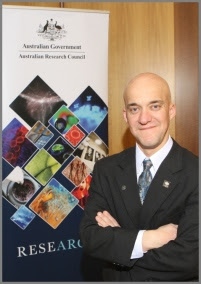BNC 3.0
by Barry Brook The 6th January 2015. That was the last time I posted an original contribution to Brave New Climate (BNC) -- at least something that wasn't a re-post (e.g., from The Conversation),
a guest post, an Open Thread or a side note... In other words, the BNC
blog has fallen fallow for well over a year. I think it's about time for
a reboot! So here's to BNC 3.0..
The 6th January 2015. That was the last time I posted an original contribution to Brave New Climate (BNC) -- at least something that wasn't a re-post (e.g., from The Conversation),
a guest post, an Open Thread or a side note... In other words, the BNC
blog has fallen fallow for well over a year. I think it's about time for
a reboot! So here's to BNC 3.0..
The original blog started back in August 2008 (first post here). It got a real reboot in late 2009, and then a false dawn in 2014. This time, I think it'll stick.
So what's been going on? I moved down to the far south in 2014 to take up a research and teaching position as the Chair of Environmental Sustainability at the University of Tasmania
(based in the School of Biological Sciences). At UTas I started a new
research programme on the dynamics of eco-evolutionary patterns
(D.E.E.P.), which has a new website at ecological-dynamics.org and a Twitter handle @ecol_evo. I work on projects spanning Wildlife, Ecosystems & Landscape Dynamics (WELD), Forests, Trees & Agroforestry (FTA), and Evolutionary Ecology (EE). There are plenty of opportunities for students!
 In May 2016 I was awarded a 5-year Australian Laureate Fellowship by the Australian Research Council,
which will fund a >$4M research project looking at disaggregating
the drivers of land-use change, and assessing the implications of
different development pathways on biodiversity. The big vision thing is to establish a multidisciplinary Institute for Future Landscapes and Ecosystems in Tasmania. Here's a summary of the ARC project:
In May 2016 I was awarded a 5-year Australian Laureate Fellowship by the Australian Research Council,
which will fund a >$4M research project looking at disaggregating
the drivers of land-use change, and assessing the implications of
different development pathways on biodiversity. The big vision thing is to establish a multidisciplinary Institute for Future Landscapes and Ecosystems in Tasmania. Here's a summary of the ARC project:The success of biodiversity conservation depends on how effectively society can 'decouple' environmental impacts from economic growth and rising human prosperity. This project will involve a systematic analysis of contemporary and historical data on agriculture, energy use and urbanisation, to identify the consumption and technology pathways that can most effectively mitigate the future extent and impact of land-use change. This synthesis will underpin the development of new forecasting and optimisation tools using an innovative hierarchical meta-modelling approach, and seeks to identify key intervention points where policy or technological change can most effectively mitigate negative impacts at regional and global scales. A key outcome will be the resolution of inherent trade-offs between ongoing human development and the competing need to conserve habitats, ecosystems, and species.
Obviously,
these goals tie strongly to the themes of BNC, focused as it is on the
intersection between technology, global change and environmental
sustainability.
 Over the last year or so I've been in involved with the Nuclear Fuel Cycle Royal Commission in South Australia, serving on the Expert Advisory Committee. The final report was released on 6 May 2016,
and I would encourage BNC readers to look through it. For this reason I
have necessarily been relatively quiet, publicly, on nuclear matters
over the last year.
Over the last year or so I've been in involved with the Nuclear Fuel Cycle Royal Commission in South Australia, serving on the Expert Advisory Committee. The final report was released on 6 May 2016,
and I would encourage BNC readers to look through it. For this reason I
have necessarily been relatively quiet, publicly, on nuclear matters
over the last year.
I
now plan to start posting regularly (but not to a schedule!) on BNC
again. One thing I hope to do is write a collection of short posts
to critique some key issues/arguments that have been propagated over the
last few years; ones that really cry out for critical scrutiny. These
will be written largely for my own edification, but I hope you'll find
them useful.
More soon!

No comments:
Post a Comment